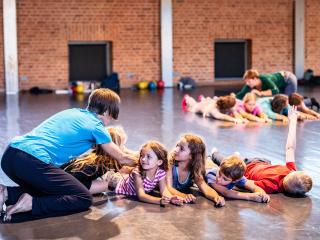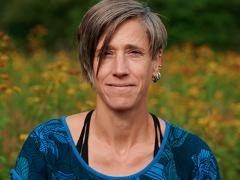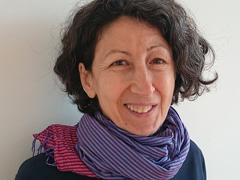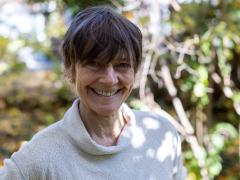
- Movement Development
DE+EN | 6-day workshop in C.A.R.E
The second module focuses on the complexity of Infant Movement Developmentals (IMD).Tonus, sense of balance and primitive reflexes are treated especially with regard to their importance for later learning processes (reading, writing,...) of the children.
The sequence of the movement development elicits through relfexes and the inner and outer environment of the infant. We experience this practically and understand its theory. Reflex integration, sense of balance, eye and brain development are put into a context and context for learning processes (reading, writing,...).
The training of non-judgmental analytical observation of movement is an important cornerstone in the interaction with the carers. The physical experience of individual movement sequences, reflexes and steps forms the basis for the contextualization of accompaniment and support possibilities.
- Tone
- Movement development first year
- Roll/ Yield/ Push/ Reach/ Pull
- Primitive reflexes/ hold and position reflexes
- Organ of balance
- Brain development
- Eyes
- Movement observation / movement analysis
- Context/practical application/fields of practice/case studies
- Interaction with caregiver
This workshop is also part of the whole professional training in C.A.R.E.
Ausführliche Seminarinformationen
C.A.R.E. – Creativity, Attachment, Resilience, Education
c.a.r.e. stands for Creativity, Attachment, Resilience, and Education. Cultivating care for oneself and others forms a vital foundation for relationships—both with ourselves and those around us.
Our training program equips participants with key insights from neuroscience, pedagogy, psychology, and somatics, focusing on the core of human coexistence: human development. These principles are designed to support professionals in therapeutic, educational, and social fields, while also offering tools for personal growth.
The c.a.r.e. Approach
The c.a.r.e. Program is designed to deepen self-awareness and strengthen personal resilience—essential steps toward fostering supportive relationships with others. Rather than reliving retraumatizing memories, C.A.R.E. helps participants understand how past experiences shape the nervous system and self-perception.
Through targeted work on early childhood reflexes, embryonic development, and self-regulation, the program helps repattern dysfunctional survival strategies while building new resources for stability, flexibility and well-being. C.A.R.E. integrates innovative somatic practices with neuroscientific research, attachment theory, and developmental psychology.
Who Benefits from c.a.r.e.?
This program serves a dual purpose:
- Enhancing professional skills in resource-oriented, attachment-based support.
- Encouraging self-reflection to recognize and transform personal patterns.
By exploring the connections between movement and nonverbal interaction, C.A.R.E. empowers participants to apply these principles in both their personal and professional lives.
200 UE / 6 modules / 4 somatic methods / 3 instructors
This innovative training combines several somatic methods (IBMT; BMC®, INPP, Feldenkrais, Cranio-Sacral Osteopathy, Experiential Anatomy, Authentic Movement) with the latest theory and research on child development. A somatic approach can provide effective and simple support for babies, children and adolescents who are facing challenges in learning, development or emotional regulation, whether big or small. This programme will support you to integrate somatic approaches into your practice, providing a combination of body awareness and embodiment training with practical somatic exercises and approaches appropriate to specific client groups.
Who is this training suitable for?
The training offers a comprehensive professional development programme suitable for those working with babies, children and young people in a range of education and health care contexts. It is relevant to educators, social workers, midwives, doulas, physiotherapists , paediatric nurses, doctors , teachers, psychologists and no medical practitioners in the field of dance, music and theatre provision for children.
Training Goals
- Familiarity with the fundamentals of child development
- The ability to recognise the profound interconnections between the nonverbal and verbal dimensions of consciousness
- A somatic and theoretical understanding of the ongoing development and learning processes
- An understanding of the interpersonal emotional exchange of the development process and how to support it in relationship
- Knowledge of the psycho-physical processes of learning
- An understanding of Brain development
- The ability to recognise different developmental aspects of the different client groups
- The ability to integrate somatic approaches and methods into working with children
- An understanding of the Importance and fundamentals of communication with parents and carers
- Skills to recognise developmental and learning challenges within their client group.
Once qualified you will
- Be able to develop playful-somatic movement programs for different age groups, which support their development.
- Be familiar with"preverbal language” and able to playfully integrate childhood movement development and reflexes in a variety of contexts
- Be able to recognise and understand the presence of persistent primitive reflexes and be able to implement strategies to address this.
- Be able to recognise compensatory behaviours in your client group
- Be able to identify and develop support possibilities for development and learning difficulties / blockages
- Create an appreciative, appreciative and attentive atmosphere as a place of learning and playing
Curriculum
Module 1 | tba 2026 | Embryology
|
Module 2 | tba 2027 | Infant movement development
|
Module 3 | tba 2027 | Becoming Self
|
Module 4 | tba 2027 | Embodied Pathways
|
Module 5 | Jan 31 - Feb 04, 2026 | Motivation, Engagement & Vitality
|
Module 6 | Mar 30 - Apr 03, 2026 | Embodying Creation
|
Seminarleiter*innen

Heike Kuhlmann
www.heikekuhlmann.net
MSME, BMC®-Practitioner, dancer, -educator, choreographer, MA Performance Studies/Choreography
Heike is interested in the unfolding process of human beings. It is more than the individual unfolding, but in how people can meet each other at eye level through personal development and inclusion of structural conditions in her somatic facilitations. Being a condition to become Critical Somatics. She accompanies somatic processes in individual sessions, courses, workshops and trainings. Activism and somatics are interwoven in her artistic work. More information on: www.somatik-tanz-choreographie.de, www.heikekuhlmann.net

Adalisa Menghini
Teacher, choreographer, performer
Adalisa studied at the S.N.D.O in Amsterdam, after which she completed her M.A. in Neurophysiological Psychology. She is a teacher of the Feldenkrais Method. She works with professional and non-professional dancers, children and seniors. She was nominated twice as best choreographer of the "Giocabriga". In collaboration with K. Wickenhäuser, she has brought performances with school children to museums. Twice they have won the "Kinder zum Olymp!" award. She teaches at the Tanzfabrik, the Somatic Academy Berlin and at the Berlin University of the Arts.

Ka Rustler
Ka Rustler has been performing, researching and analyzing somatic practices and their embodiment in movement, choreography and therapy for over 30 years. BMC® Teacher
Kosten
Costs
Single workshop
810€
Complete professional training C.A.R.E
3680€ + Certification 200€
paying via installments is possible.
Dates
Jan 31st - Feb 5th, 2025 | Friday-Wednesday | 10:00am - 05:30pm
Curriculum
Module 1 | tba | Embryological basis of our life
|
Module 2 | Jan 31 - Feb 05, 2025 | Development of child´s movement
|
Module 3 | Apr 12-16, 2025 | Moving, playing, interacting with kids (0-3 years | 3-7 years)
|
Module 4 | Oct 27-31, 2025 | Movement and learning
|
Module 5 | Jan 31 - Feb 04, 2026 | Moving, playing, interacting with kids (8-12 years | 13-16 years)
|
Module 6 | Mar 30 - Apr 03, 2026 | Somatic working experience with kids and teenagers
|
Anmeldeinformationen
BerlinSomatische Akademie Berlin
Paul-Lincke-Ufer 30
10999 Berlin | side building
1st backyard
4th floor
- Full Price: 810.00 EUR
